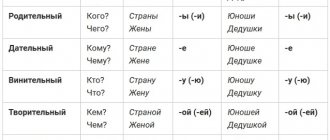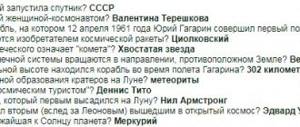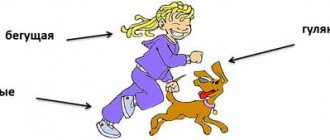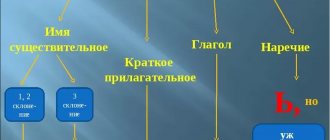First declension
The first declension includes
- man
- uncle
- young man
- boy
- birch bark
- road
- nanny
- village.
Here we will add common nouns , which, depending on the context, can name both male and female persons, for example:
Examples
hard worker, bully, crybaby, good fellow, fidget, upstart, angry, slob
- Ruffnut Vanya
- crybaby Valya
- fidget Seryozhka
- Well done Stasik.
Declension of nouns in -iya
Note that a number of feminine nouns of the first declension end in -iya:
- story
- stage
- lecture.
Such words in the dative and prepositional singular forms have the ending - and in contrast to typical first declension nouns, such as the word “grass”.
Let's compare:
- And. n. (what?) lecture, grass
- R. n. time for (what?) lectures, no grass
- d.p. pay attention to (what?) lecture, grass
- V. n. I see (what?) a lecture, grass
- etc. we admire (what?) lecture, grass
- p.p. will report (about what?) about the lecture, about the grass
Declension of nouns in Russian
The declension of nouns is a change in cases in accordance with gender. In Russian morphology, there are three main types of declension of nouns But besides them, there are several more declinations.
Nouns in Russian vary according to cases and numbers. This change in the form of a word is called declension. Changing nouns by case and number in Russian is called declension. In accordance with gender and case endings in the singular form, nouns are divided into three declensions.
First declension
The first declension includes
- man
- uncle
- young man
- boy
- birch bark
- road
- nanny
- village.
Here we will also add common nouns , which, depending on the context, can name both male and female persons, for example: hard worker, bully, crybaby, good fellow, fidget, upstart, angry, slob.
- Ruffnut Vanya
- crybaby Valya
- fidget Seryozhka
- Well done Stasik.
Declension of nouns in -iya
Note that a number of feminine nouns of the first declension end in -iya. Such words in the dative and prepositional singular forms have the ending - and in contrast to typical first declension nouns, such as the word “grass”.
Let's compare:
- And. n. (what?) lecture, grass
- R. n. time for (what?) lectures, no grass
- d.p. pay attention to (what?) lecture, grass
- V. n. I see (what?) a lecture, grass
- etc. we admire (what?) lecture, grass
- p.p. will report (about what?) about the lecture, about the grass
Second declension
The second declension combines
- genius, author, hero, nightingale;
- house, little man, little fence, little voice;
- word, deed, village, field, sea, meeting, jam.
Declension of neuter nouns into -i
Let us pay special attention to neuter nouns that end in the letter combination -i:
- mood
- combination
- indication.
Such nouns are declined in a special way: in the singular forms of the prepositional case, we note the ending -i, and not -e, as in neuter words like “lake” or “field”.
Let's observe and compare:
- And. n. (what?) indication, lake
- R. n. no (what?) indications, lake
- d.p. we are surprised (by what?) at the direction to the lake
- V. n. I read (what?) instructions, I see a lake
- etc. I’m interested in (what?) indication, lake
- p.p. I’ll tell you (about what?) about the indication, about the lake
Third declension
The third declension includes
- true story
- joy
- lilac
- azure
- luxury
- bitterness
- whim
- thing .
Table “Three Declensions of Nouns”
Declension Gender Ending Examples
| First | male | -and I | young man uncle |
| female | bird ground | ||
| Second | male | zero | father's day |
| average | -o, -e | grain happiness | |
| Third | female | zero | daughter rye |
Indeclinable nouns
We will separate into a separate group the heterogeneous neuter nouns ending in -mya:
- burden
- udder
- crown
- flame
- stirrup
- flame
- time
- banner
- Name
- tribe
- seed
- masculine noun "path"
- neuter noun "child".
These words are called indeclinable because partly they are inflected as nouns of the third declension, and in the instrumental case they have the ending of the second declension.
Let's compare:
- i.p. flame, child, path, night
- r.p. flame, child, path, night
- d.p. flame, child, path, night
- v.p. flame, child, path, night
- etc. flame, child(s), way, night
- p.p. about the flame, about the child, about the path, about the night.
Other types of noun declension
In the Russian language, a whole layer of vocabulary is made up of nouns - former adjectives or participles. They have retained the grammatical form of the previous part of speech and are declined like adjectives. We classify these words as a separate type of noun declension, for example:
- employee
- mourner
- arrived
- term
- passerby
- bathroom
- comma
- housemaid
- hot
- predicate
- ice cream.
A separate type of declension consists of nouns that have only a plural form It is impossible to determine the gender of these words and, therefore, to attribute them to one of the three main types of declension: hard worker, bully, crybaby, good fellow, fidget, upstart, angry, slob, rake, trousers, scales, swing, rouge, railing, ink, flakes, cream, canned food, everyday life, 24 hours, vacations, towns, chess, farewells, elections, debates
Standing apart are indeclinable nouns, which
Source: https://RusskiiYazyk.ru/chasti-rechi/sushhestvitelnoe/tipyi-skloneniya-imen-sushhestvitelnyih.html
Second declension
The second declension combines
- genius, author, hero, nightingale;
- house, little man, little fence, little voice;
- word, deed, village, field, sea, meeting, jam.
Declension of neuter nouns into -i
Let us pay special attention to neuter nouns that end in the letter combination -i:
- mood
- combination
- indication.
Such nouns are declined in a special way: in the singular forms of the prepositional case, we note the ending -i, and not -e, as in neuter words like “lake” or “field”.
Let's observe and compare:
- And. n. (what?) indication, lake
- R. n. no (what?) indications, lake
- d.p. we are surprised (by what?) at the direction to the lake
- V. n. I read (what?) instructions, I see a lake
- etc. I’m interested in (what?) indication, lake
- p.p. I’ll tell you (about what?) about the indication, about the lake
Russian language test Case of nouns, grade 3
Russian language test Case of nouns, grade 3 with answers. The test includes 2 options, each with 10 tasks.
1 option
1. The declension of nouns is:
1) changing them by cases 2) changing them by numbers 3) changing them by gender
4) formation of new nouns
2. Nouns in the prepositional case answer the questions:
1) who? what? 2) to whom? what? 3) by whom? how?
4) about whom? about what?
3. Indicate a phrase with a noun in the instrumental case.
1) left without a tail2) hidden under the wing3) fluttering in the air
4) go east
4. Indicate the preposition that is used with nouns in the genitive case.
1) over2) for3) to
4) in
5. are nouns used without prepositions?
1) in the instrumental3) in the prepositional2) in the nominative
4) in the dative
6. Indicate a phrase with a noun in the genitive case.
1) raccoon hole2) hunting a wolf3) be afraid of a lion
4) climb on a horse
7. In which sentence is the word ship used in the accusative case?
1) The ship sailed slowly. 2) The ship was led by a captain. 3) The deck of the ship was filled with cargo.
4) A ship entered the harbor.
8. Put the nouns given in brackets in the correct case and number.
Driving past birch trees (grove) __________. The joy of unexpected (meeting) __________.
Alpine greens (pasture) __________.
9. Insert the noun finger in the required case and number into stable phrases.
Circle __________, get __________ into the sky, suck out __________, you can count __________.
10. Write out the highlighted nouns from the text.
Write the case in parentheses next to each noun. Every morning we go to school . teacher meets us there . We study many interesting subjects. In math class we learn to count. In literature class we get acquainted with books by children's writers. In the lesson of the discipline “The World Around us” we rejoice at new discoveries.
Option 2
1. The declension of nouns is:
1) formation of new nouns 2) changing them by numbers 3) changing them by gender
4) changing them by case
2. Nouns in the dative case answer the questions:
1) who? what? 2) to whom? what? 3) by whom? how?
4) about whom? about what?
3. Indicate a phrase with a noun in the instrumental case.
1) hides in the ground2) digs a hole3) flies over the field
4) wrote to my father
4. Indicate the preposition that is used with nouns in the genitive case.
1) above2) about3) to
4) in
5. are nouns used without prepositions?
1) in the nominative2) in the dative3) in the genitive
4) in the prepositional
6. Indicate a phrase with a noun in the genitive case.
1) horse's mane2) stare at the tiger3) beware of the boar
4) hunting an animal
7. In which sentence is the word car used in the accusative case?
1) The car was racing along the highway. 2) The car was driven by an experienced driver. 3) The car’s engine needs repair.
4) A truck drove into the parking lot.
8. Put the nouns given in brackets in the correct case and number.
The glow of distant (fire) __________. Construction of winter (vegetable storage) __________.
Watching evening (TV show) __________.
9. Insert the noun water in the correct case into stable phrases.
Get out of __________ unscathed, pound __________ in a mortar, a lot of __________ has leaked, __________ is written with a pitchfork.
10. Write out the highlighted nouns from the text.
Write the case in parentheses next to each noun. In the summer the guys visited Moscow. On Red Square they observed the changing of the guard of honor. The Kremlin amazed me with its beauty. At the Tretyakov Gallery, children got acquainted with paintings by famous artists. The guys really enjoyed the trip.
Answers to the test in the Russian language Case of nouns 3rd grade 1st option 1-12-43-24-25-36-17-28. Groves, meetings, pastures9. Finger, finger, finger, fingers10. To school (V. p.), teacher (I. p.), subjects (R. p.), in class (P. p.), with books (T. p.), discoveries (D. p.)
Option 2
Source: https://testschool.ru/2018/03/09/test-po-russkomu-yazyiku-padezh-imen-sushhestvitelnyih-3-klass/
Indeclinable nouns
We will separate into a separate group the heterogeneous neuter nouns ending in -mya:
- burden
- udder
- crown
- flame
- stirrup
- flame
- time
- banner
- Name
- tribe
- seed
- masculine noun "path"
- neuter noun "child".
These words are called indeclinable because partly they are inflected as nouns of the third declension, and in the instrumental case they have the ending of the second declension.
Let's compare:
- i.p. flame, child, path, night
- r.p. flame, child, path, night
- d.p. flame, child, path, night
- v.p. flame, child, path, night
- etc. flame, child(s), way, night
- p.p. about the flame, about the child, about the path, about the night.
Other types of noun declension
In the Russian language, a whole layer of vocabulary is made up of nouns - former adjectives or participles. They have retained the grammatical form of the previous part of speech and are declined like adjectives. We classify these words as a separate type of noun declension, for example:
- employee
- mourner
- arrived
- term
- passerby
- bathroom
- comma
- housemaid
- hot
- predicate
- ice cream.
A separate type of declension consists of nouns that have only a plural form It is impossible to determine the gender of these words and, therefore, assign them to one of the three main types of declension.
Examples
hard worker, bully, crybaby, good fellow, fidget, upstart, angry, slob
rakes, trousers, scales, swings, blush, railings, ink, cereal, cream, canned food, everyday life, days, holidays, towns, chess, farewells, elections, debates
Standing apart are indeclinable nouns, which
Examples
metro, coat, kangaroo, zebu, hummingbird, suluguni, dragee, dressing table, canoe, aloe, chassis, taxi, blinds, sconces





